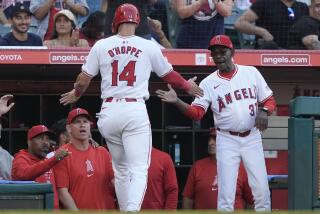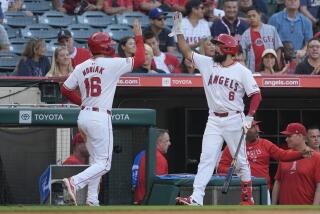They arenât alike on the surface, but baseball unites them. The lessons in diversity these kids are learning will hold them in good stead.
Itâs more than an hour before practice, and in a patch of quiet afternoon shade at Rowland Heights County Park, Refugio Ramos plays catch with his son, Richard. Every day, they come to toss the ball, to talk and dream.
âIâm gonna play for the Dodgers when I get big,â Richard tells his father for about the billionth time.
âThatâs good Richie,â his father says.
Earlier this season, one of Richardâs heroes, Mike Piazza, commented that diversity among the Dodger players was standing in the way of team unity, that off the field players fell into cliques based on ethnicity, making it difficult to achieve the all-for-one, one-for-all chemistry that teams desire.
Richard doesnât get it. His two best friends are of Korean ancestry. He has another friend of Indian descent. He also has friends whose ancestors are from Guatemala, El Salvador. Some are âEnglish,â he says, meaning they are white.
Refugio and his wife are from Mexico; Richard was born in Paramount. He spoke only Spanish before preschool last year, but his English is coming around nicely, his father says. âI been in this country for 37 years, and my English is not as good as his.â For this, he is proud.
âNice one Richie,â his father says upon a diving catch that sends Richard sprawling on the thick cushion of grass. He gets up slowly. âThrow it higher,â he says.
Diversity doesnât stand in the way of anything on Richardâs team. The coach, Ernie Gallardo, is part Irish, part German and the rest Mexican. His wife, Lisa, who helps coach the team, is of Mexican and Japanese ancestry.
That makes son Alex âa real mutt,â his father says.
Donny Wongâs dad is Chinese American. His mom is part Irish, part Welsh. Andrew Chen is Chinese American. Giancarlo Scott is African American. On the roster of 12, there are a host of Mexican American teammates. Joshua Huggett, who plays a heartfelt air guitar when the spirit moves him, is Italian, French, German, and bits and pieces of other persuasions.
The team, which draws players from Rowland Heights, Hacienda Heights and neighboring communities, is further diversified by the fact that there are three girls. How would the Dodgers deal with that? Two players take away from the teamâs diversity because they are so much alike: Jennifer and Amanda Fernandez are twins.
*
There are many lessons to be learned in the shade of parks like this, with families gathered around picnic baskets, shirts and skins vying on the basketball courts, soccer balls flying through the air. The Angels are focusing on getting down on one knee to field ground balls, to run to first, not third, when they get a hit.
And, more important, their parents say, even though itâs not discussed, the Angels are learning about diversity, about coming together as a team with people of different cultures.
âItâs important,â says Debra Wise, Giancarloâs mom. âI like it a lot that heâs learning about different cultures. At his Kindercare, there are Asian Americans, African Americans, Hispanics, whites. I donât want him to have just one view of the world.â
As practice time nears, players begin arriving. Ernie and Lisa Gallardo arrive with Alex, who puts on his glove to warm up with Richard. Alex, 4, takes an artistic approach to life, which he extends to baseball. His favorite part of the game is drawing pictures in the infield sand.
âYou should see our walls,â his dad says.
Richard lobs the ball to him, and Alex immediately raises his arms as a shield and runs away.
âDonât run away,â his father says, âuse your glove.â
Gallardo says the players on this team couldnât care less about cultural differences. âTheyâre all just kids to each other. Thereâs no color, no boy or girl. Theyâre out here to have fun.â
With the exception of Alex, the players are 5 or 6 years old, and this is their first taste of organized (to the extent 5- and 6-year-olds can be organized) ball. There is no pitching. The ball is placed on a tall tee and the players whack it. Score is not kept, but if you ask the Angels, they will tell you unflinchingly that they won their first game.
âOK, I heard you guys did pretty good on Saturday,â Gallardo tells them as they gather around him. He was competing in a softball tournament and missed the Angelsâ opener. âSorry I wasnât there. I hope you guys all had bats because sometimes Iâm a dummy, and I forgot to give the equipment to one of the parents.â
âHey,â Richard says, âDonât call you a dummy.â
The others agree.
âBut anyhow, weâre going to play again on Saturday, so weâre going to practice batting,â Gallardo continues. Before he can finish his sentence, the Angels are off and running. âCome back. Everybodyâll get a turn to bat.â
As they arrange themselves between makeshift bases, practice begins.
âRemember,â shouts Gallardo, âwhat do we say when someoneâs batting?â
The Angels have this one down solid. As a team, in bird-like banter: âHey batta, batta. Hey batta, batta.â
At some point, as they grow older, they will come to their own understandings about diversity. Some may form circles of friends based largely on ethnicity.
âYou see it in high school,â Wise says. âIt starts around junior high. Like people come together. They become clannish . . . I donât know why.â
The lessons they are learning now have to do with coming together as a team. They are alike, not in ethnicity or gender but in this shared enjoyment of a game, of hearing their parents cheer for them, of this new tingle that surges from their hands, through their arms and into their hearts when they swing and make solid contact with the ball.
They are all different, but they are all Angels.
*
Parents know there will come a time when they will need to explain how people--older people--sometimes say things or do things based on race at the expense of an ideal society.
âIâm not so idealistic or naive to think itâs not going to happen,â says Stacey Wong, Donnyâs mom. âIt just hasnât come up yet. I think weâll just deal with it when it happens and try to teach them we should all just try to get along together, because it isnât going to work the other way around.â
One by one, the Angels take turns whacking the ball, running to first, not third. They give full attention to the practice with the exception of Alex, who is digging around in the grass. Their commitment to the game is in early bloom, not yet tempered, and there still are more important things in life than baseball.
Like ice cream.
So when the seductive, tinkling melody of a refrigerated truck reaches their ears, practice, without discussion, is suddenly terminated. They sprint wide-eyed, like a herd of Piazzas rounding third and thundering home, to mob the truck.
More to Read
Are you a true-blue fan?
Get our Dodgers Dugout newsletter for insights, news and much more.
You may occasionally receive promotional content from the Los Angeles Times.










